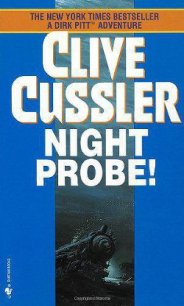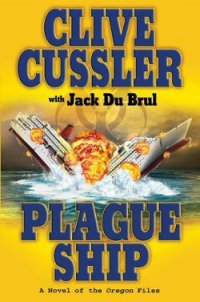Flood Tide - Cussler Clive (читать книги без txt) 📗
The first rays of the sun were spreading over the mountains to the east when Pitt turned to Julia, who was sitting beside him, her arms clasped around the young girl. He looked over at her, seeing her face in the light for the first time, shocked at the punishment inflicted on what must have been delicate features, and fully appreciating her courage and stamina in surviving her ordeal.
Cold anger suddenly overwhelmed him. “My God, those bastards really worked you over.”
“I haven't looked in a mirror, but I suspect I won't be showing my face hi public for a while,” she said gamely.
“If your superiors at INS give out medals, you'd rate a chestfull.”
“A certificate of merit in my file is the best I can hope for.”
“Tell everybody to hold on tight,” he advised her. “We're coming into rapids.”
“After we reach the mouth of the river, what then?” she asked.
“According to my calculations, any place on a map called Grapevine Bay must have grapes and grapes mean vineyards and vineyards mean people. The more, the merrier. Shang's mad dogs wouldn't dare attack us with a hundred U.S. citizens looking on.”
“I'd better call the INS field agents again and alert them to the fact that we've left the area and give them our destination.”
“A good idea,” said Pitt, pushing the throttle forward to its stop with one hand while handing her the phone with the other. “They can concentrate their forces on the retreat instead of worrying about us at the cabin.”
“Did you hear from your NUMA people?” Julia shouted above the increased roar of the exhaust.
“They're supposed to meet and pick me up after we reach Grapevine Bay.”
“Do they use little open aircraft painted yellow?”
He shook his head. “NUMA leases executive jets and helicopters with turquoise color schemes. Why do you ask?”
Julia tapped Pitt on the shoulder and pointed over the stern at a yellow ultralight that was chasing them down the river. “If they're not friends, they must be foes.”
PlTT TOOK A FAST LOOK OVER HIS SHOULDER AT THE AIRCRAFT rapidly closing over the wake of the Chris-Craft. He recognized it as an ultra-light, a pusher-engined, high-winged monoplane with tricycle landing gear and tandem seats for two people. The pilot sat forward, out in the open, with his passenger behind and slightly elevated. The airframe consisted of aluminum tubing braced with thin cable. Propelled by a lightweight, reduction-drive, fifty-horsepower engine, it could move fast. Pitt guessed it was capable of 120 miles an hour.
The pilot was flying directly over the middle of the river no more than forty feet off the water. He was good, Pitt admitted. The air currents swirled through the narrow canyon in a series of strong wind gusts, but the pilot compensated and kept the ultralight on a straight and level course. He was coming after the runabout intentionally and purposefully, like someone who knew exactly what he was about to do. There was no hesitation and no uncertainty about who was going to end up the loser in the coming unequal contest. God knows Pitt had no doubts, not when he saw a man strapped in the seat behind the pilot holding a stubby machine pistol in his hands.
“Force everyone to get down as low as they can,” Pitt ordered Julia.
She spoke in Chinese, passing on Pitt's command, but the runabout's passengers were already so overcrowded in the small cockpits they had no place to go. All they could do was settle as low as humanly possible in the leather seats and duck their heads.
“Oh, dear lord,” gasped Julia. “There are two more of them about a mile behind the first.”
“I wish you hadn't told me,” said Pitt, hunched over the steering wheel, willing the runabout to go faster. “They're not about to let us escape and spread the gospel about their shady operation.”
The lead ultralight roared so low over the speeding Chris-Craft, the draft from its propeller blades whirled a cloud of spray that dampened the occupants of the boat. Pitt expected to hear gunshots, see holes appear in the smoothly varnished mahogany, but the aircraft passed on without attacking. It pulled up sharply, its tricycle landing wheels missing the runabout's windshield by no more than five feet.
Kung Chong sat strapped into the rear seat of the ultralight bringing up the rear and gazed with smug satisfaction at the speeding runabout below. He spoke into the transmitter attached to his crash helmet. “We have the boat in sight,” he reported.
“Have you commenced your attack?” asked Lo Han from the mobile security vehicle.
“Not yet. The lead plane reports our quarry is not alone.”
“As we suspected, there were two of them.”
“Not two,” said Kung Chong. “More like ten or twelve. The boat appears crowded with old people and young children.”
“The devil must have found a family camping along the river and forced them into the boat to act as hostages. Our adversary, it seems, will stop at nothing to preserve his life.”
Kung Chong raised a pair of binoculars with one hand and peered at the passengers huddled in the dual cockpits. “I believe we have an unforeseen problem, Lo Han.”
“We've had nothing but problems for the past twelve hours. What is it now?”
“I can't be certain, but it appears the occupants of the boat are immigrants.”
“Impossible, the only aliens brought ashore are either confined, on their way inland or dead.”
“I could be mistaken.”
“Let's hope you are,” said Lo Han. “Can you fly close enough to identify their nationality?” asked Lo Han.
“For what purpose? For me to eliminate the devil responsible for the destruction of Qin Shang's yacht and the infiltration into the alien holding cells, those who are with him must die too. What difference if they are Chinese or American?”
“You are right, Kung Chong,” acknowledged Lo Han. “Do whatever you must to protect the enterprise.”
“I shall give orders to launch the attack.”
“Be certain there are no spectators in the vicinity.”
“The river is clear of recreational craft, and the shorelines are empty of people.”
“Very well, but keep a sharp eye. We cannot afford eyewitnesses.”
“As you command,” said Kung Chong. “But time is running out. If we do not destroy the boat and those in it within the next few minutes, all opportunity will be lost.”
“Why didn't he fire?” asked Julia, squinting against the glare from the morning sun on the surface of the river.
“A hitch in their assassination plans. They thought I worked alone. He's reporting to his boss that I'm loaded to the gunwales with passengers.”
“How far to Grapevine Bay?”
“A good twelve or thirteen miles.”
“Can't we pull onto shore and take cover in the trees and rocks?”
“Not a practical idea,” he said. “All they'd have to do is land in the nearest clearing and hunt us down. The river is our only chance, slim as it is. You and the others keep your heads down. Let them wonder where I picked up a load of passengers. If they're looking closely they'll spot the folds on your eyelids and realize you're not the descendants of European ancestry on a picnic.”
The venerable Chris-Craft covered another two miles of river before the lead ultralight dipped low over the river and increased speed, its nose aimed menacingly at the runabout. “No more peaceful intentions,” said Pitt calmly. “He means business this time. How good are you with a handgun?”
“My qualifying scores on the range are higher than most of the male agents I know,” she said as matter-of-factly as if she was describing her latest hairdo.
He took the bundle from under his seat, unwrapped the towel and handed her his old automatic pistol. “Ever shoot a Colt forty-five?”
“No,” she answered. “When required, most of us at INS pack a Beretta forty-caliber automatic.”
“Here are two spare clips. Don't waste your shells firing at the engine or fuel tank. As a target, it's too small to hit on an aircraft passing overhead at more than fifty miles an hour. Aim for the pilot and the gunner. One good body shot and they'll either crash or head for home.”




